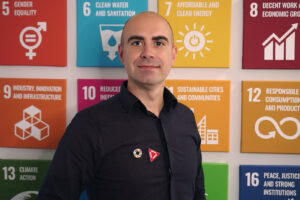Online Course
Transformation Design
Learn how to design for transformation through hands-on methods and tools to benefit the planet, society, your life, and your professional context.
Course overview
The updated version of this online course will be available as of May 1.
Today, the world is transforming at a fast(er) pace.
The transformation encompasses technology, sustainability, social systems, culture, healthcare, economics, education,… the list goes on and on.
This transformation is broad AND deep.
And, it is disrupting our society more profoundly than ever before. Apart from some of the positive effects, concerns are growing rapidly about our climate, inequality, education, health, wellbeing, economic prosperity, security, and safety.
In this course we explore more responsible ways to use the global transformation for the benefit of society and provide you with the hands-on methods and tools to really start; from your own work, life and context.
Introduce Transformation Design to your team and organisation with our live training!
Format of the course
Module 1 – Re-adaptive Learning
You will familiarize yourself with the 15 S Model: a Strategic Design process applicable to any aspect of your organisation, its outcome can be varied and understood as a coherent ecosystem of dynamic solutions. At the end of this module, you will know all 15S’s and how to use them within your work. You will wrap up module 1 with a peer-to-peer learning session in smaller groups (self-organised with instructions from the trainers)Module 2 – Sustainable Change and Diversity
In this module you will learn about the six Sustainable Development Goals transformations, the four roadblocks that are holding us back from having impact on sustainable change and how design and its best traits can help. You will also learn ways to organize diversity within your team or organization and how this will impact sustainable change and transformation. You will wrap up module 2 with a peer-to-peer learning session in smaller groups (self-organised with instructions from the trainers)Module 3 – Transformation
In this module, you will learn about your personal role in transformation: how does the self relate to the system, and what role do our intentions have? You will learn about the differences between change and transformation, between complicated and complex problems, between a global and local outlook, and between designing in the open and behind closed doors. You will walk away with a clear notion of the need for co-inspiration as the enabler for true transformation. You will wrap up module 3 with a peer-to-peer learning session in smaller groups (self-organised with instructions from the trainers)Module 4 – Experimentation
In this module, you will learn how a culture of experimentation is crucial in the organization of any transformation. You will learn how to formulate experiments fitting for transformation design challenges and how co-creation is a key to successful transformation. We wrap up the entire course with a live session.
Learning Outcomes
After successful completion of the course, participants should be able to understand:
- During this course you will follow 4 modules. Each module will have an introductory, and theoretical and practical video to start your learning experience.
- Then, you will use the workbook to make exercises that will be reflected within your designated team of peers (who also follow the course).
- At the start and end of the course, a live facilitated session is scheduled to get you on your way and wrap up all learnings with the full cohort.
- Additionally, you will work with the extensive ‘Transformational Triggers’ toolkit.
Certification
A certificate of completion issued by Digital Society School (Amsterdam University of Applied Sciences) will be sent to successful participants. Successful completion can be achieved by attending all modules of the course.
For whom is this course?
- Corporate leaders who wish to pave the way for sustainable (digital) transformation;
- Design leaders seeking ways to inspire their teams towards new mindsets;
- Entrepreneurs and start-ups looking to create, develop and scale businesses in a transformational context;
- Public sector leaders that want to work more sustainably, inclusively and help create shared value in participative ways;
- Everyone who is involved in or feels responsible for the (digital) transformation of their organisation;
- Everyone who cares about the planet or society and is looking for ways to integrate design, technology and social innovation to unleash transformation within their organizations.
Questions you may have
Covered Digital Society School competencies
- Collaboration and Co-creation
- Create solutions for social impact
- Adaptive learning
- Interdisciplinary system thinking
- Human-Centered Design
Meet the course instructors

Marco van Hout
is co-founder and creative director of Digital Society School. As a recognized design leader and pioneer in experience design in the past 20 years he has gained broad expertise on topics such as transformation design, digital society, UX, human(ity) and life centered design. He believes in the creation of a ‘global learning society’ to ignite transformation towards a better world. In this light he has co-founded the Global Goals Jam with the UNDP and is a community liaison for transformation/ design for SDG’s at the World Design Organization. Marco likes to be hands on with big concepts and is known for making concepts and ideas tangible through the creation of toolkits (e.g. the Design Method Toolkit) and workshops. He is a globally sought after speaker, educator and trainer and has travelled the world, speaking/teaching about emotional design, experience-driven design and design for sustainable development and transformation.



